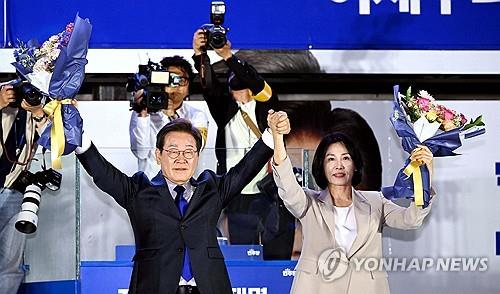- California Assembly OKs highest minimum wage in nation
- S. Korea unveils first graphic cigarette warnings
- US joins with South Korea, Japan in bid to deter North Korea
- LPGA golfer Chun In-gee finally back in action
- S. Korea won’t be top seed in final World Cup qualification round
- US men’s soccer misses 2nd straight Olympics
- US back on track in qualifying with 4-0 win over Guatemala
- High-intensity workout injuries spawn cottage industry
- CDC expands range of Zika mosquitoes into parts of Northeast
- Who knew? ‘The Walking Dead’ is helping families connect
Political uncertainty falls below pre-martial law levels: BOK
The level of political uncertainty in South Korea has returned to levels seen prior to the martial law incident, following the recent presidential election, the central bank said Friday.
According to data submitted by the Bank of Korea (BOK) to Rep. Cha Gyu-geun of the Rebuilding Korea Party, the political uncertainty index stood at 1.5 as of June 4, the day after the election, in which Democratic Party candidate Lee Jae-myung defeated conservative rival Kim Moon-soo.
The index, which had been around 0.4 in early December, spiked to a record high of 12.8 in mid-December, following former President Yoon Suk Yeol’s surprising declaration of martial law on Dec. 3.
Though the index rose slightly above 1 after the election, the BOK noted that such minor fluctuations are common in normal times and should not be interpreted as meaningful.
The index is compiled by the BOK’s research department by tallying the number of media articles that include both the keywords “politics” and “uncertainty” in their headlines or main text.
It reflects relative values, with the long-term average from the beginning of 2000 set at zero, the BOK said.
The previous record high was 8.8, recorded on March 17, 2004, following the passage of the impeachment motion against the late former President Roh Moo-hyun.
The economic uncertainty index also fell to 1.2 as of June 4, a level similar to the 1.1 recorded on Dec. 3.
The index had surged to 5.4 on Jan. 2 but gradually declined, reaching as low as 0.5 on May 15, the BOK said.
“The political uncertainty that has weighed on the economy over the past six months is expected to ease significantly,” BOK Gov. Rhee Chang-yong said at a press briefing last week. “Political factors are no longer having a meaningful impact on the won-dollar exchange rate.”
The Korean won had weakened sharply earlier this year, nearing 1,500 won per U.S. dollar, largely due to the domestic political turmoil and concerns over the sweeping tariff measures under U.S. President Donald Trump’s administration.
But it rebounded to its strongest level in about seven months Thursday, closing at 1,358.4 won per dollar.













